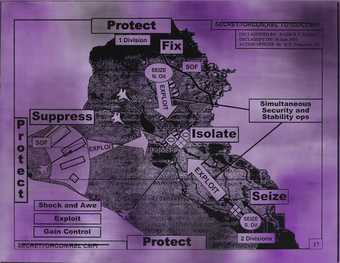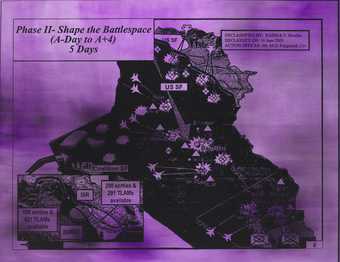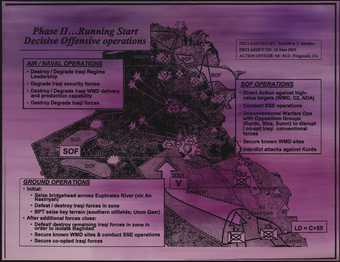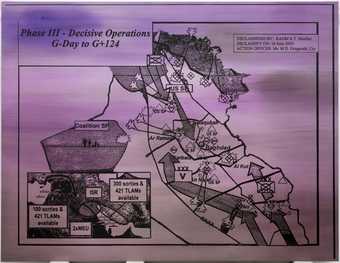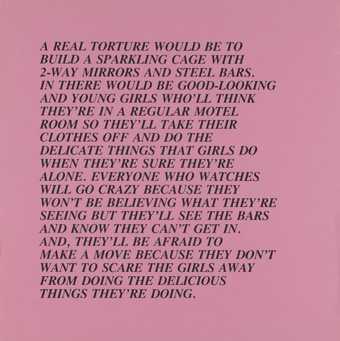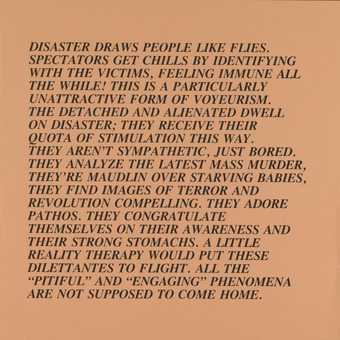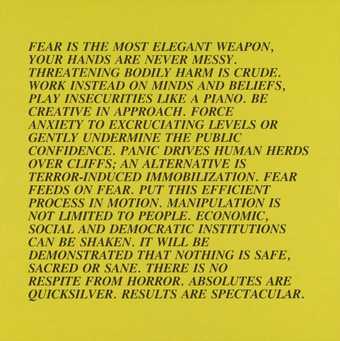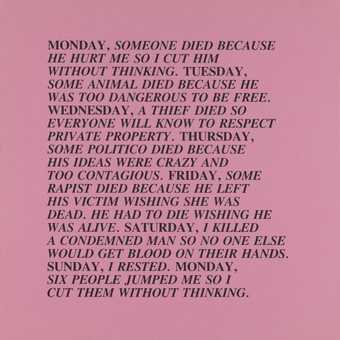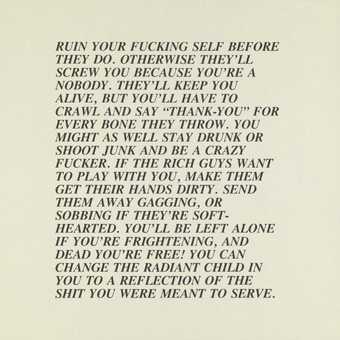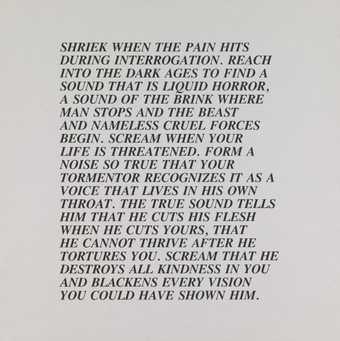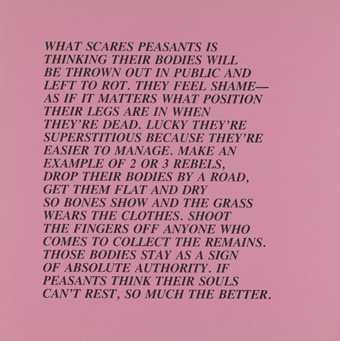In Tate Modern
- Artist
- Jenny Holzer born 1950
- Medium
- 7 light emitting diode columns
- Dimensions
- Overall display dimensions variable
object, each: 4190 × 136 × 136 mm - Collection
- ARTIST ROOMS Tate and National Galleries of Scotland
- Acquisition
- ARTIST ROOMS Acquired jointly with the National Galleries of Scotland through The d'Offay Donation with assistance from the National Heritage Memorial Fund and the Art Fund 2008
- Reference
- AR00082
Summary
BLUE PURPLE TILT consists of seven tall and narrow LED (light-emitting diode) signs leaning against the gallery wall at an equal distance from one another. The top and bottom ends of the signs are bevelled so that they can be neatly mounted to the wall at the same angle. Vertical strips of identical light-blue text simultaneously scroll up the seven signs from the bottom to the top until they disappear from view, followed by a new message. The messages scroll up the signs at varying speeds and rhythms and occasionally flash, making them difficult to read. The texts also run up the back of the double-sided signs in red, purple or blue, but these are only perceptible as a colourful glow cast onto the supporting wall and floor.
The texts are drawn from Holzer’s previous works, including Truisms (1977–9) (see Tate T03959) such as ‘ABUSE OF POWER COMES AS NO SURPRISE’, and the more emotional Laments (1988–9), for example ‘I CAN MAKE WOMEN’S BREASTS WEEP’. All of the messages used in BLUE PURPLE TILT are ‘found’ phrases, originally appropriated from myriad literary, poetic and public sources. Holzer explains:
There can be a deliberate scrambling, or at least a heaping of many messages. Sometimes the messages are conflicting, and other times the language and the messages will be blunt and to the point. I routinely invite the reader to sort out the offerings and complete the thoughts, and to echo, amplify or shrink from the feeling that the work elicits.
(Quoted in Museum of Contemporary Art Chicago 2010, p.119.)
Holzer has exhibited her text-based work outside in public spaces since the 1980s. Her work has ranged from pasting posters in urban environments to projecting messages onto prominent buildings in countries around the world. The LED signage of BLUE PURPLE TILT makes reference to the technology used in modern public advertising and warning signs. Holzer has said that having viewers consider the uses of technology to attract attention has been a particular motivation for her in selecting this medium:
The move to electronic technology had to do with my needing to be where people look. I thought I should present as many hard germane subjects large, loud and well as what’s done for celebrity gossip, concerts, products and the sometimes too cautious reporting of the news.
(Quoted in Museum of Contemporary Art Chicago 2010, p.120.)
As technology develops and expands, LED signage will eventually be superseded by different modes of communication. Anticipating the potential obsolescence of the LED, Holzer has specified that she wishes BLUE PURPLE TILT to preserve its ‘LED appearance’, even if the work is adapted in future years to suit more contemporary technology.
Further reading
Michael Auping, Jenny Holzer, New York 1992.
Jenny Holzer: Protect Protect, exhibition catalogue, Museum of Contemporary Art Chicago, Chicago 2010.
Florence Ritter
January 2012
Does this text contain inaccurate information or language that you feel we should improve or change? We would like to hear from you.
Online caption
In her reference to everyday experiences and emotions, Holzer’s witty and provocative slogans offer a critical reflection on modern society. 'BLUE PURPLE TILT' collates messages from the artist’s career, charting her development from the early 'Truisms' and 'Survival' series, including pithy texts such as "PROTECT ME FROM WHAT I WANT", through to the anonymous declarations of the 'Inflammatory Essays' and personal musings of 'Lamentations'. Seven luminous LED signs are used to transmit her texts, emanating brightly and enveloping the viewer. The staging of her messages is central to Holzer’s practice, and serves to emphasise how language shapes our cultural environments.
Explore
- abstraction(8,615)
-
- non-representational(6,161)
- formal qualities(12,454)
-
- light(150)
- repetition(391)
You might like
-
Jenny Holzer Protect Protect
2007 -
Jenny Holzer Shape the Battlespace
2007 -
Jenny Holzer Phase I... Running Start Shape the Battlespace pewter
2007 -
Jenny Holzer Phase II... Running Start Decisive Operations violet
2007 -
Jenny Holzer Force at End of Phase III (If Required) violet
2007 -
Jenny Holzer Phase III - Decisive Operations violet
2007 -
Jenny Holzer [no title]
1979–82 -
Jenny Holzer [no title]
1979–82 -
Jenny Holzer [no title]
1979–82 -
Jenny Holzer [no title]
1979–82 -
Jenny Holzer [no title]
1979–82 -
Jenny Holzer [no title]
1979–82 -
Jenny Holzer [no title]
1979–82 -
Jenny Holzer [no title]
1979–82 -
Jenny Holzer Truisms
1984


